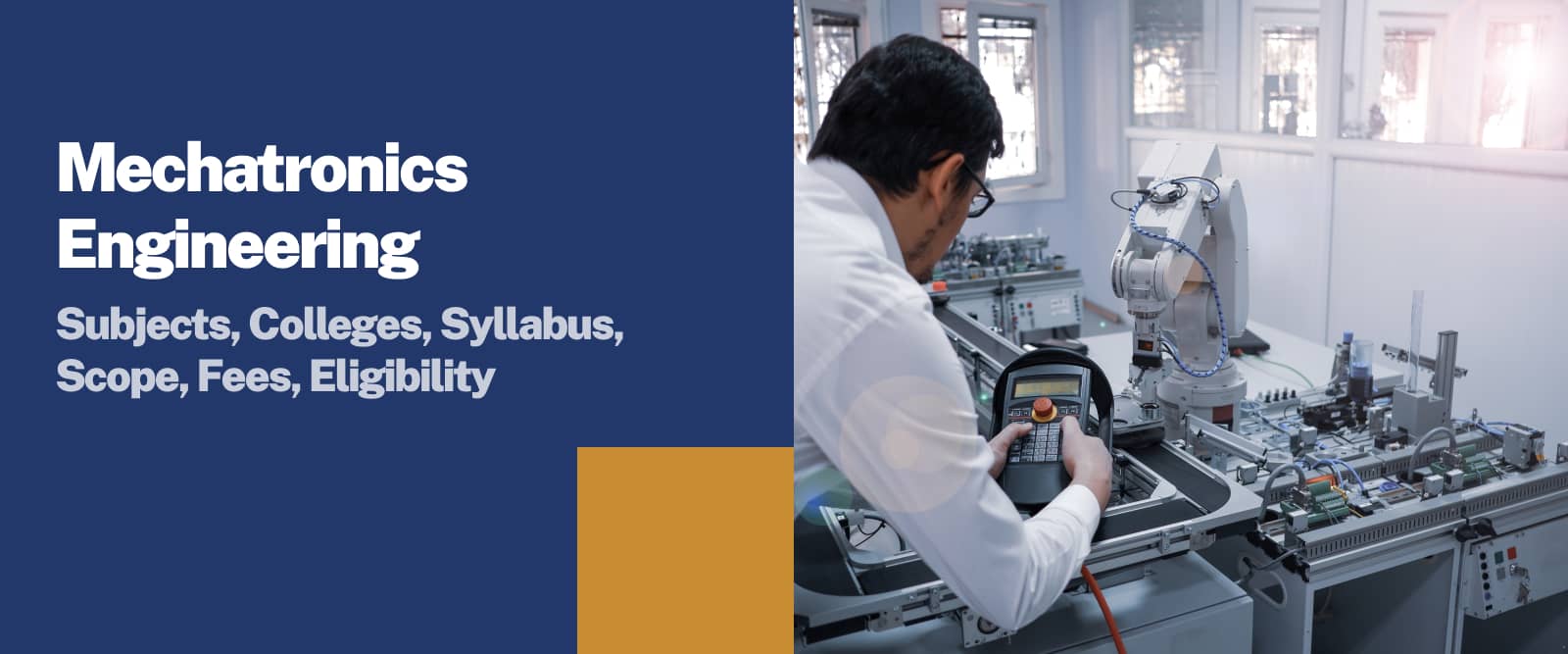5800 students unlocked their dream jobs with UG/PG programs in top colleges. Apply Now!
B.Tech Mechatronics Engineering is an interdisciplinary approach to merging mechanical and electrical engineering, electronic engineering, and computer science. Mechatronics Engineering studies systems integrating electrical and mechanical components with contemporary controllers and microprocessors.
B.Tech (Mechatronics Engineering) is a Mechanical Engineering Undergraduate study. This B. Tech course is concerned with electronics, mechanics, computers, and controls. Combining all this knowledge, professionals can create more specific, more cost-effective, dependable, and adaptable commercial and industrial products.
The Bachelor of Technology in Mechatronics Engineering programme lasts four years. However, this varies per institute. The Mechatronics Engineering degree course is significant and job-oriented, opening many professional opportunities for those who complete it. In this informative blog, we have outlined everything you need to know about Mechatronics Engineering.
Continue reading to learn more.
[Also read: highest paying engineering jobs]
Define Mechatronics Engineering
Mechatronics comprises the words mecha (mechanics) and tronics (electronics). In other words, when technology and produced items become more closely and organically integrated into mechanisms, it will take time to discern where one stops and the other begins.
Today, Mechatronics Engineering means testing, developing, and operating equipment and machinery with a high degree of functional integration of mechanical systems with computer control and electronics.
Mechatronics Engineering is an interdisciplinary area that synergistically combines the traditional knowledge of hydraulics, mechanical engineering, electronics, pneumatics, computer science, and optics. A typical mechatronic system detects environmental signals and processes them to create output signals, such as forces, movements, and actions.
Mechatronics aims to increase technical systems' functionality while also developing new concepts for machinery and equipment with "artificial intelligence" built in. You can read our blog on new technology trends to know more about new technologies.
Mechatronics Engineering: History
In 1969, the senior engineer of a Japanese corporation, Yaskawa, coined the term Mechatronics. In 1971, the corporation was given trademark rights to the term. The term quickly gained widespread popularity in the industry, and Yaskawa chose to relinquish his rights to it in 1982 to enable unfettered usage. Mechatronics systems are composed of components from several physical domains that are intimately connected and interact with one another. Furthermore, the components' behaviour is very non-linear.
What Mechatronics Engineering Can Do and its Scope
Mechatronic items are widely employed in industry and daily life. Designing mechatronic goods necessitates a strategy that considers multidisciplinary design, market-related restrictions, multifunctionality, user-friendliness, and the need to minimise the cost of the entire product and operating duration.
Thus, designers who build mechatronic devices should have broad multidisciplinary knowledge, the capacity to collaborate in an interdisciplinary design team, team management abilities, and an understanding of cutting-edge computer-aided engineering tools. Furthermore, knowledge of scheduling and prototyping mechatronic systems is critical.
Jobs for Mechatronics Engineers
According to a job listing website, here is a list of top job roles where companies hire mechatronics engineers in India
- Robotics engineer (Average Salary range: ₹1.8 Lakhs to ₹7.2 Lakhs)
- Instrumentation engineer. (Average Salary range: ₹2 Lakhs to ₹12 Lakhs)
- Automation engineer. (Average Salary range: ₹1.8 Lakhs to ₹11 Lakhs)
- Mechanical engineer (Average Salary range: ₹1.2 Lakhs to ₹7.4 Lakhs)
- Electronics engineer. (Average Salary range: ₹2.5 Lakhs to ₹6.8 Lakhs)
Mechatronics Engineering: Course Highlights
|
Course Level |
Graduate (BE/B.Tech) |
|
Duration |
Four Years |
|
Exam Type |
Annual and Semester |
|
Eligibility |
Students must complete 12th grade with mathematics, physics, and chemistry. |
|
Admission Procedure |
Merit-Based and Entrance Examination |
|
Accepted entrance exams |
JEE Main, WBJEE, GATE, BITSAT, VITEEE, TS ICET, MAH CET, and other university-level entrance exams. |
|
Average Course Fee |
₹10,000 to ₹10,00,000 |
|
Average Starting Salary |
₹2 lakhs to ₹10 lakhs |
B.Tech Subjects: Mechatronics Engineering
B.Tech Mechatronic Engineering is a synergistic blend of the fundamentals of Electronics, Mechanical, Computer Science, and Electrical. As a result, it will feature subjects from all of these:
- Electronics: Linear Integrated Circuits, Digital Electronics, Control Systems, Analog Electronics, Microprocessors and Microcontrollers
- Electrical: Industrial Electronics
- Mechanical: Strength of Materials, Theory of Machines, Thermodynamics and Heat Transfer, CAD/CAM, Hydraulics and Pneumatics, and Manufacturing Process
- Computer Science: OOP (Object-Oriented Programming)
B.Tech Mechatronics Engineering in India: Syllabus
The syllabus of Mechatronics Engineering courses in India as prescribed by numerous colleges and universities are as follows:
Semester I:
- Basic Engineering
- Physics, Mathematics, and Chemistry
- English
- Practicals:
- Personality Development
- Computer Literacy
- Engineering Graphics/Workshop Practice
- Chemistry and Physics Laboratory
Semester II:
- Biology for Engineering Mechanics and Engineers
- Basic Engineering and Mathematics II
- Principles of Environmental Science
- Value Education
- Material Science
- Practicals:
- Computer Programming Practice
- Active Learning Laboratory
Semester III:
- Electronic Devices and Circuits
- Electrical Engineering
- Thermodynamics and Heat Transfer
- Materials Technology
- Practicals:
- Materials Technology Laboratory
- Electronic Devices and Circuits Laboratory
- Electrical Engineering Laboratory
Semester IV:
- Theory of Machines
- Mathematics for Mechatronic Systems
- Mechanics of Solids and Fluids
- Instrumentation and Control Systems
- Fluid Power Control
- Practicals:
- Strength of Material Laboratory
- Manufacturing and Assembly Drawing
- Fluid Power Control Laboratory
Semester V:
- Sensors and Actuators
- PLC and Data Acquisition Systems
- Manufacturing Technology
- Linear Integrated Circuits and Digital Systems
- Elective-I:
- Industrial Engineering and Factory Automation
- Industrial Safety and Environment
- Flexible Manufacturing Systems
- Design for Manufacture and Assembly
- Drives and Controls for Automation
- Computer-Aided Inspection and Quality Assurance
- Practicals:
- Linear Integrated Circuits and Digital Systems Laboratory
- Computer Skills
- Measurements and PLC Laboratory
- Manufacturing Process Laboratory
Semester VI:
- Embedded Systems
- TQM and Reliability Engineering
- Design of Machine Elements
- Microprocessors and Microcontrollers
- Fundamentals of CAD/CAM
- Elective-II:
- Intelligent Controllers
- Automated Control Systems
- Consumer Electronics and Industrial Electronics
- Microelectromechanical Systems
- Computer Communications
- Practicals:
- Microprocessor Laboratory
- CAD/CAM Laboratory
- Computer Skills
Semester VII:
- Power Electronics
- Economics and Principles of Management
- Design of Mechatronic Systems
- Digital Signal Processing
- Elective-III:
- Process Planning and Cost Estimation
- Microprocessor-Based System Design
- Artificial Intelligence and Neural Networks
- Practicals:
- Industrial Training II
- Mechatronic Laboratory
- Digital Signal Processing Laboratory
Semester VIII:
- Elective-IV:
- Robotics Engineering and Automotive Electronics
- Modelling and Simulation
- 3D Animation and Computer Graphics
- Elective-V
- Software Engineering and Biomedical Instrumentation
- Intelligent Manufacturing Technology and Rapid Manufacturing Technology
- Image Processing and Machine Vision
- Project Work
Top Entrance Examinations for Admission to B.Tech in Mechatronics
|
Top Entrance Exams for Mechatronics Engineering |
|
|
JEE Mains (all India basis) |
JEE Advanced (All-India basis) |
|
AP EAMCET (for admission in Andhra Pradesh) |
TNEA (for admission in Tamil Nadu) |
|
TS EAMCET (for admission in Telengana) |
COMDEK UGET (for admission in Karnataka) |
|
MHT CET (for admission in Maharashtra) |
WBJEE (for admission in West Bengal) |
|
GATE (All-India basis) |
BITSAT (University-level entrance conducted by BITS Pilani) |
Conclusion
In recent years, Mechatronics has shown a 5% increase in employment compared to Electrical Engineering. Mechatronics is widely used not just in India but also globally. Germany has a good market for Mechatronics engineers. Now, if you want to tap the global job opportunities after getting your Mechatronics degree, we suggest you enrol with Sunstone. With Sunstone, you can get job-focused training that can help you stay ahead of your competitors.
FAQ - Mechatronics Engineering
What is the importance of mechatronics in daily life?
Mechatronics engineering is the amalgamation of mechanical and electronics engineering. It combines the fundamentals of both disciplines to create better products that enrich the daily lives of humans. Mechatronics engineering has ample contributions to the field of health care, manufacturing, and tools we use on a daily basis.
HELP
Take the first step towards your dream job.
ABOUT THE AUTHOR


